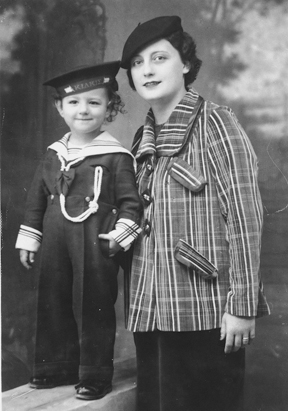
Dolly was a wondrous child born to Marie and Moise Torres in 1937. In the studio portrait with her mother, Dolly, with her springy curls, smiles bashfully. This sweet girl wears her sailor suit with a jaunty cap in the nautical theme of her birthplace, Salonica, a port city in Greece. She and her mother are unaware of the larger world events that will soon take over their lives.
Salonica was called by some the Jerusalem of the Balkans since Jews had settled there in large numbers after being expelled from Spain and Portugal. Dolly spoke Ladino (the Judeo-Spanish language written in Rashi Hebrew script) at home with family and with her little friends.
Moise was the owner of a photography studio and Marie was busy as a part owner of a manufacturing business. In a snapshot, Marie looks as if she has stopped off from work to pose briefly in front of her husband’s studio. Their lives as Sephardic Jews centered around the Sabbath and celebrating Jewish holidays. A constant worry in their lives began when Katy, their older daughter, developed tuberculosis in 1939 at the age of 4 and had to be hospitalized. No one knew at the time that she would have to remain as an inpatient for six years.
Soon war raged in Europe with Germany defeating Greece and entering Salonica in 1941. Marie and Mosie, like other Jews, were singled out for abuse. The catastrophic anti-Jewish measures began in February 1943. Dolly’s life changed dramatically; she was told they had to leave their home, her dear friends and favorites toys. They were being forced to move into a ghetto. Somehow Dolly and her mother ended up there without Moise. In March 1943, the Germans tricked the Jews into boarding “transport” trains. Marie had packed clothes for the work she was misled to believe would be waiting for her in Krakow, Poland. Dolly and Marie boarded a car with the other people.
When the doors of the freight car opened, 6-year-old Dolly had arrived in Auschwitz. The effect of chaotic shouting and dogs barking was instant terror for her. Still, mother and daughter were allowed to stay together. Told they needed to bathe, they undressed. Unaware, Dolly walked with her mother and the others from their beloved city into a gas chamber; they were locked in and killed. By August 1943 the last trains had reached Auschwitz and the Jewish community of Salonica had ceased to exist.
The plight of Dolly was simple. Girls and boys under the age of 12 years were dispensable. In one transport from Poland of 2,500 individuals, 80 percent were young daughters and sons, sisters and brothers, and playmates who were never officially registered but just killed in Auschwitz. Hundreds of baby carriages were shipped to Germany, hinting at the number of babies who had died in the camp. Dolly left almost no trace. She didn’t write letters or sign official documents, possibly only a single photograph of her remains. Hundreds of thousands of Jewish girls and boys shared Dolly’s end. The future generation of European Jews had been destroyed.
During these Days of Remembrance, it is our sacred duty to cherish the memories of our own loved ones and all victims. When we mourn their loss, we join in the history of our people, l’dor vador. We are the link between past generations and future ones. What we do to remember, therefore, matters.
We Jews are a people who have a passion for defending our freedom. In their time, so did the victims; but those who spoke up were treated with ruthless violence. We have the freedom to pay tribute to them, though, by exercising our rights to speak up for the values and principles we believe in. We can defend causes about which we care deeply, like safeguarding the lawful rights of vulnerable groups (by opposing religious freedom bills), protecting and strengthening voting rights, and pressing for bail reform to stop punishing the poor and racial minorities under the current system. Though if we are indifferent or complacent, we will choose a different path. Then we must ask ourselves, “Am I sacrificing speaking up for silence?” Silence is easier but it doesn’t protect our way of life as we know it.
Mary Greenberg, Ph.D., serves on the State of Kansas Holocaust Commission. Her speaking engagements on preventing anti-Semitism and the link between leadership and anti-Semitism are based on her research that advances the study of the Jewish people in the Diaspora. This column is written in memory of her relatives, the daughters and sons of the Haguel and Levy families from Salonica, who perished in Auschwitz during Passover 1943.
Yom HaShoah — Holocaust Remembrance Day
The local Yom HaShoah service, commemorating the 76th anniversary of the Warsaw Ghetto uprising and the 56th anniversary of the dedication of Kansas City’s Memorial to the Six Million, will take place at 1:30 p.m. Sunday, May 15, at the Lewis and Shirley White Theatre.
Israel officially began commemorating Yom HaShoah at sundown yesterday, May 1.


